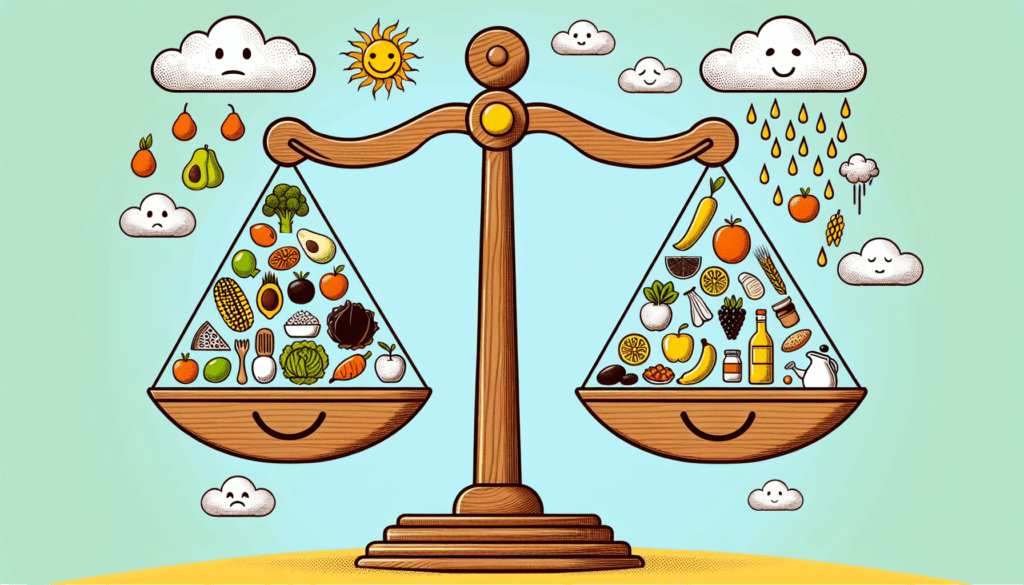Depression can have a debilitating impact on one’s overall well-being, especially as we age. As a boomer, the challenges of managing your mood and mental health may require a comprehensive approach. While therapy and medications are common avenues for treatment, focusing on your diet can also be a powerful tool. By incorporating certain dietary tips into your daily routine, such as increasing the intake of omega-3 fatty acids and antioxidants, while reducing processed foods and refined sugars, you may discover a significant improvement in your mood and overall mental health. Let’s explore some simple dietary adjustments that can help you better manage depression and enhance your well-being.

The Link Between Diet and Depression in Boomers
Understanding the connection
As we age, it becomes crucial to prioritize our mental well-being and address any symptoms of depression that may arise. Research has shown a clear link between diet and depression, particularly in the boomer generation. The foods we consume play a significant role in our overall mood and mental health. By understanding this connection, we can make informed dietary choices to support our emotional well-being.
Factors that contribute to depression in boomers
Depression can stem from various factors, such as genetics, lifestyle choices, major life events, or underlying medical conditions. For boomers, it is essential to recognize the specific factors that may contribute to depression. These factors often include retirement, loss of loved ones, health issues, and changes in social dynamics. However, one critical factor that is often overlooked is diet. A poor diet lacking in essential nutrients can significantly impact our mental health, exacerbating feelings of depression and low mood.
Following a Balanced Diet
Importance of balanced nutrition
Maintaining a balanced diet is vital for overall health, but it is especially important for managing depression and enhancing mood in boomers. A balanced diet ensures that you are getting all the necessary nutrients, vitamins, and minerals required for optimal brain function and emotional well-being. By focusing on a well-rounded diet, you can provide your body and mind with the fuel they need to function optimally.
Food groups to include in the diet
To achieve a balanced diet, it is crucial to include a variety of food groups in your daily meals. These food groups include fruits, vegetables, whole grains, lean proteins, and healthy fats. Fruits and vegetables provide essential vitamins, minerals, and antioxidants that support brain health. Whole grains provide a steady release of energy, while lean proteins offer amino acids necessary for neurotransmitter production. Healthy fats, such as those found in fatty fish, nuts, and seeds, are beneficial for brain health and mood regulation.
Key Nutrients for Boosting Mood
Omega-3 fatty acids
Omega-3 fatty acids are essential for brain health and have been shown to have a positive effect on mood disorders, including depression. These fatty acids can be found in fatty fish like salmon, mackerel, and sardines, as well as in flaxseeds, chia seeds, and walnuts. Consuming foods rich in omega-3 fatty acids can help reduce inflammation in the brain and support the production of neurotransmitters that regulate mood.
Vitamin D
Vitamin D is not only important for bone health but also plays a vital role in regulating mood and preventing depression. As we age, our bodies may become less efficient at producing vitamin D through sun exposure alone. Including vitamin D-rich foods in your diet can help combat deficiencies and support mental well-being. Good sources of vitamin D include fatty fish, fortified dairy products, and mushrooms.
B vitamins
B vitamins, including B6, B9 (folate), and B12, are essential for a healthy nervous system and optimal brain function. Low levels of these vitamins have been associated with an increased risk of depression in older adults. To ensure an adequate intake of B vitamins, include foods such as leafy greens, whole grains, legumes, eggs, and lean meats in your diet.
Antioxidants
Antioxidants protect the body against oxidative stress and inflammation, both of which can contribute to depression. Including antioxidant-rich foods in your diet can help support your mental well-being. Berries, dark chocolate, colorful fruits and vegetables, nuts, and green tea are all excellent sources of antioxidants.
Foods to Avoid
Processed and sugary foods
Highly processed and sugary foods may provide a temporary mood boost, but they can ultimately contribute to feelings of depression and worsen overall mental health. These foods have a high glycemic index, causing rapid spikes and drops in blood sugar levels, leading to mood swings and fatigue. Limiting the intake of processed snacks, sugary drinks, and desserts can have a significant impact on managing depression in boomers.
Caffeine and alcohol
While the occasional cup of coffee or glass of wine can be enjoyed in moderation, excessive consumption of caffeine and alcohol can worsen symptoms of depression. Caffeine is a stimulant that can increase anxiety levels and disrupt sleep patterns, both of which can negatively impact mood. Alcohol is a depressant that can disrupt neurotransmitter levels and exacerbate symptoms of depression. It is best to limit caffeine and alcohol intake to promote optimal mental well-being.

The Role of Gut Health
Impact of gut health on mental well-being
Emerging research suggests that there is a strong connection between gut health and mental well-being. Our gut contains millions of neurons, often referred to as the “second brain,” that communicate with the brain and influence our mood. An imbalanced gut microbiome, characterized by an overgrowth of harmful bacteria and a lack of diversity in beneficial bacteria, has been associated with an increased risk of depression. Taking care of your gut health is, therefore, critical in managing depression in boomers.
Foods that support a healthy gut
To promote a healthy gut, it is important to incorporate foods that support the growth of beneficial bacteria. Fermented foods such as yogurt, sauerkraut, kimchi, and kefir contain probiotics that help restore balance in the gut. Additionally, including prebiotic-rich foods like onions, garlic, bananas, and asparagus can provide nourishment for the good bacteria in your gut.
Incorporating Probiotics for Mood Enhancement
Understanding the benefits of probiotics
Probiotics, often referred to as “good bacteria,” can play a significant role in supporting mental well-being. These living microorganisms can help restore balance in the gut and have been shown to improve mood and reduce symptoms of depression. By incorporating probiotics into your diet, you can support the growth of beneficial bacteria in your gut, potentially alleviating depressive symptoms.
Sources of probiotics
Probiotics can be found in a variety of food sources, including yogurt, kefir, sauerkraut, kimchi, tempeh, and miso. Including these foods in your diet can help improve gut health and promote a positive mood. Additionally, if obtaining probiotics through food sources is challenging, consider taking a high-quality probiotic supplement after consulting with a healthcare professional.

The Importance of Hydration
Hydration and mood regulation
Staying properly hydrated is often overlooked but is crucial for maintaining good mental health. Dehydration can lead to cognitive decline, fatigue, and a decline in mood. A lack of water can affect the balance of neurotransmitters in the brain, leading to feelings of depression and irritability. Ensuring adequate hydration can support optimal brain function and help regulate mood.
Tips for staying hydrated
To stay adequately hydrated, aim to drink at least eight glasses of water per day. Set reminders or keep a water bottle with you as a visual cue to encourage regular water intake. Additionally, incorporate hydrating foods such as fruits, vegetables, and herbal teas into your diet. These foods and beverages contribute to your overall daily fluid intake and provide additional nutrients beneficial for mental well-being.
Mindful Eating for Emotional Well-being
Practicing mindful eating
Mindful eating involves paying attention to the present moment while consuming food, fully engaging the senses and savoring each bite. This practice can help improve the relationship between food and emotions, reduce emotional eating, and enhance overall emotional well-being. By being more mindful of your eating habits, you can foster a more positive and healthy relationship with food.
Eating patterns to promote positive mood
In addition to practicing mindful eating, adopting certain eating patterns can also contribute to a more positive mood. Eating regular, balanced meals throughout the day can help regulate blood sugar levels and stabilize mood. Furthermore, focusing on whole, unprocessed foods and incorporating a variety of flavors and textures can make meals more enjoyable and nourishing for your mind and body.

The Role of Mediterranean Diet
The Mediterranean diet and mental health
The Mediterranean diet has long been associated with numerous health benefits, including a reduced risk of depression. This eating pattern emphasizes fruits, vegetables, whole grains, lean proteins, healthy fats, and herbs and spices. The high intake of omega-3 fatty acids, antioxidants, and other essential nutrients in the Mediterranean diet can support brain health and positively impact mood.
Adopting a Mediterranean-style eating pattern
To adopt a Mediterranean-style eating pattern, prioritize whole, plant-based foods such as fruits, vegetables, legumes, and whole grains. Include fish, poultry, and dairy products in moderation and limit red meat consumption. Replace unhealthy fats with sources of healthy fats, such as olive oil and nuts. Incorporate herbs, spices, and flavorful ingredients to enhance the taste of your meals. By following a Mediterranean-style eating pattern, you can nourish your body and support your mental well-being.
Consulting a Nutritionist or Dietitian
Seeking professional guidance
If you are unsure about creating a personalized diet plan, it is highly recommended to consult a nutritionist or dietitian specializing in mental health. These professionals can provide expert guidance and tailor dietary recommendations to your specific needs and preferences. They can help you identify nutrient deficiencies, optimize your diet to support mental well-being, and monitor your progress.
Creating a personalized diet plan
Working with a nutritionist or dietitian will allow you to create a personalized diet plan that takes into account your individual dietary requirements and goals. They can assess your current diet, address any nutrient deficiencies, and provide recommendations for optimizing your nutrition to support mental health. With their guidance, you can develop a sustainable and enjoyable eating plan that nourishes your body and uplifts your mood.
In conclusion, the link between diet and depression in boomers is a vital aspect that should not be overlooked. By following a balanced diet, incorporating key nutrients, avoiding certain foods, prioritizing gut health, and adopting mindful and Mediterranean-style eating patterns, boomers can take proactive steps towards managing depression and enhancing their mood. Additionally, seeking professional guidance from a nutritionist or dietitian can provide personalized advice and support in developing a healthy and satisfying diet plan. Remember, small changes in your diet can make a significant difference in your mental well-being.


